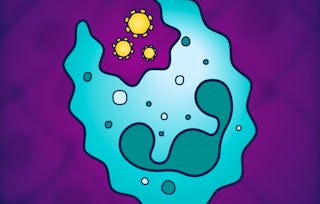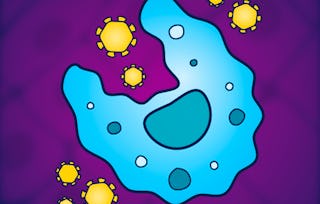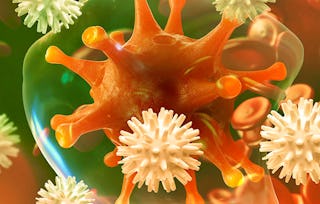In this course, you will learn about the role of immune responses of the adaptive (acquired) immune system which provides specialised immunity against pathogens.

Immunology: Adaptive Immune System
5 days left! Gain next-level skills with Coursera Plus for $199 (regularly $399). Save now.

Immunology: Adaptive Immune System
This course is part of Immunology: The Immune System and its Failures Specialization


Instructors: Malgorzata (Maggie) Trela
5,780 already enrolled
Included with
(74 reviews)
Recommended experience
What you'll learn
In this course, you will explore the two main types of adaptive immune cells, T and B lymphocytes.
You will understand how their various sub-sets contribute to the overall immune response.
Finally, you will explore the effect of age on the function of the immune system.
Skills you'll gain
Details to know

Add to your LinkedIn profile
13 assignments
See how employees at top companies are mastering in-demand skills

Build your subject-matter expertise
- Learn new concepts from industry experts
- Gain a foundational understanding of a subject or tool
- Develop job-relevant skills with hands-on projects
- Earn a shareable career certificate

There are 6 modules in this course
In module one, learners will discover who B lymphocytes are and how they contribute to our immune response against pathogens. Together, we will explore how they develop, commit to becoming functional effector cells and what their effector mechanisms are. We will also investigate how the immune system prevents them from over-reacting against health cells.
What's included
7 videos4 readings2 assignments
In module two, learners will discover how T lymphocytes develop, differentiate into two main sub-types and how these contribute to the orchestration of the adaptive immune response and the direct destruction of infected cells. We will also discuss the mechanism that our body has put in place to prevent these very powerful cells from turning against the host’s healthy cells.
What's included
2 videos2 readings3 assignments
In module three, we will explore the ability of some T lymphocytes to directly kill infected and tumour cells. We will learn about the mechanisms that activate them, contrast this with other complementary immune mechanisms of direct killing, and understand how their activation is kept under tight control to avoid the destruction of healthy cells.
What's included
1 video2 readings2 assignments
In module four, we will explore the development and function of a particular type of T lymphocytes, regulatory T cells, whose main role is to regulate the overall immune response to avoid serious detrimental outcome for the host. We will look at their mechanisms of action in more details and discuss their therapeutic application for human health.
What's included
1 video2 readings2 assignments
In module five, learners will be taken on a travel journey into our body to understand how the correct immune cells get to the correct site of infection. This will involve understanding the mechanisms by which immune cells migrate from the blood stream to infected tissues and sites of activation. Importantly, together with our expert here at Imperial, we will also explore the importance for this ability to be tightly regulated.
What's included
2 videos2 readings2 assignments
In module six, we will explore the impact ageing has on the immune system. We will identify what inflammaging is, its causes and its consequences on the immune system. We will reflect on what this means in terms of therapeutical approaches for human health.
What's included
1 video2 readings2 assignments
Earn a career certificate
Add this credential to your LinkedIn profile, resume, or CV. Share it on social media and in your performance review.
Instructors


Offered by
Explore more from Basic Science
 Status: Free Trial
Status: Free TrialImperial College London
 Status: Free Trial
Status: Free Trial Status: Free Trial
Status: Free TrialImperial College London
 Status: Free Trial
Status: Free Trial
Why people choose Coursera for their career

Felipe M.

Jennifer J.

Larry W.

Chaitanya A.
Learner reviews
- 5 stars
78.37%
- 4 stars
14.86%
- 3 stars
4.05%
- 2 stars
1.35%
- 1 star
1.35%
Showing 3 of 74
Reviewed on Oct 31, 2023
Very useful in learning the basic principles of adaptive immunity. Highly recommended!
Reviewed on May 17, 2023
A comprehensive course to learn the basics of immunology. Well done and thanks!
Frequently asked questions
To access the course materials, assignments and to earn a Certificate, you will need to purchase the Certificate experience when you enroll in a course. You can try a Free Trial instead, or apply for Financial Aid. The course may offer 'Full Course, No Certificate' instead. This option lets you see all course materials, submit required assessments, and get a final grade. This also means that you will not be able to purchase a Certificate experience.
When you enroll in the course, you get access to all of the courses in the Specialization, and you earn a certificate when you complete the work. Your electronic Certificate will be added to your Accomplishments page - from there, you can print your Certificate or add it to your LinkedIn profile.
Yes. In select learning programs, you can apply for financial aid or a scholarship if you can’t afford the enrollment fee. If fin aid or scholarship is available for your learning program selection, you’ll find a link to apply on the description page.
More questions
Financial aid available,





